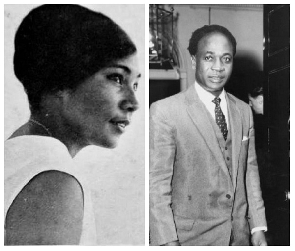The story of Ghana’s founding father, Osagyefo Dr Kwame Nkrumah, is well-known for his role in leading the nation to independence in 1957 and his vision for African unity.
However, a lesser-known aspect of his personal life involves his close relationship with Genoveva Esther Marais, a South African educator and broadcaster who was described as his confidante and, by some accounts, his alleged lover.
Genoveva Marais arrived in Ghana on February 22, 1957, just weeks before the country’s independence, to serve as an Inspector of Schools through an expatriate appointment facilitated by Michael Dei-Anang, a recruitment officer in the Colonial Civil Service.
A highly educated woman with a master’s degree earned during her time in New York and a background in teaching, writing, and broadcasting, Marais quickly became a notable figure in Ghana and later rose to the position of Head of Television Programmes at the Ghana Broadcasting Corporation.
Smiling Faces and Handshakes: How Nkrumah’s close allies bid him goodbye while plotting his ousting
It was at the Independence State Ball on March 6, 1957, that Marais first met Dr Kwame Nkrumah, then Ghana’s Prime Minister.
According to accounts, Nkrumah noticed her dancing with another man, approached her, and invited her to dance.
This encounter sparked a nearly decade-long companionship that saw Genoveva Marais become Nkrumah’s closest confidante during his time in power (1957–1966).
Described as his “bosom companion,” Marais provided emotional support to Nkrumah amidst the pressures of leadership and multiple assassination attempts, which fueled his growing paranoia and drew the two closer.
Their relationship was characterised by shared moments of leisure, including early morning tennis matches, listening to music, and discussing politics. Genoveva Marais also influenced Nkrumah’s personal style, advising on his iconic dandy outfits and hiring his tailor.
Nkrumah reportedly proposed marriage to Marais, but she declined, prioritising her career ambitions and believing that his dedication to African unity would make a wife “a hindrance rather than an asset.”
Dr Kwame Nkrumah, who married Fathia Nkrumah in 1957 and had three children with her, shared details of his relationship with Marais only with Fathia and two close associates, Ayeh Kumi and Professor Dei-Anang.
Sources indicate that Fathia was aware of the companionship and that the trio maintained an amicable dynamic.
Rare photo of Dr Kwame Nkrumah resurfaces as Ghana marks his 116th birthday
The nature of Dr Kwame Nkrumah and Genoveva Marais’s relationship remains a subject of speculation. While Marais’s 1972 memoir, ‘Kwame Nkrumah: As I Knew Him’, describes their bond as one of “affection and friendship rather than by law,” a 1966 Life magazine article referred to her as Nkrumah’s “mistress,” implying a romantic connection.
The relationship came to an abrupt end following the February 24, 1966, military coup that ousted Nkrumah while he was on a state visit to North Vietnam and China. Genoveva Marais faced severe repercussions, including detention in Togo, where she was interrogated, searched, and briefly jailed.
Ghanaian authorities labeled her as Nkrumah’s “mistress” and scrutinised her possessions, including a Ford Thunderbird she had purchased independently. During her detention, Marais endured significant hardship, including reported sexual assault by her captors, before being expelled from Ghana.
Genoveva Marais later visited Nkrumah in exile in Guinea at least once before his death in Bucharest, Romania, in 1972.
She went on to marry Victor S. Kanu, heir to a Sierra Leonean chieftaincy, and documented her experiences in her memoir, offering a rare glimpse into the personal side of Ghana’s iconic leader.
GA/MA
Watch the latest edition of BizTech below:



